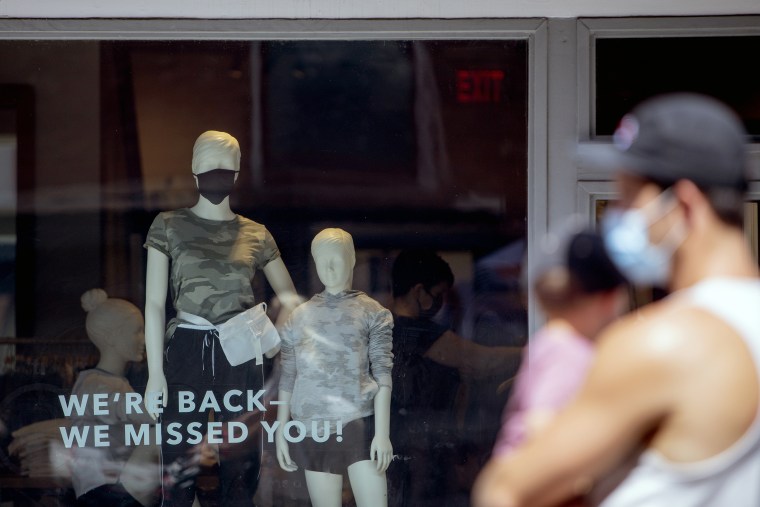Eight months into a grueling pandemic that sent thousands of stores into lockdown and others into bankruptcy, retailers both big and small are looking to President-elect Joe Biden's administration for relief.
More than 97,000 businesses have permanently closed over the course of the pandemic as states and counties issued public health orders to lock down storefronts to curb the fast-moving virus, according to estimates from Yelp.
Even well-capitalized retailers, such as Kohl's, L Brands — which owns Victoria's Secret and Bath & Body Works — and PVH, the parent company of Calvin Klein and Tommy Hilfiger, have had to cut staff and permanently shutter some stores.
Now, even with two promising vaccine candidates on the horizon, retailers are bracing for a slow crawl out of the pandemic as a new leader takes over the White House, stepping into an increasingly fraught relationship with China and a domestic economy that could fall deeper into a recession.
"So much of what we see from consumers and retailers over the next several months is very much going to depend on how we get the virus under control — and the efforts to get the virus under control certainly have big implications for how retailers will perform over next several months," said Paul Lejuez, managing director at Citigroup Global Markets. "We'll keep our fingers crossed, but it looks like the next several months could certainly be choppy."
Biden said as much in a speech Monday, when he warned again of a "dark winter" as the pandemic surges across the country, saying "things are going to get much tougher before they get easier." Biden has called on Congress to pass a stimulus bill immediately — a measure that could boost consumer spending and help small businesses weather the pandemic until a vaccine is widely adopted. Retail sales slowed in October as payroll gains lagged and government stimulus payments faded.
"If there is no government intervention and stimulus relief provided to small businesses, many more will not make it through the winter," said Elliot Richardson, co-founder and president of the Small Business Advocacy Council, based in Illinois. "It will cost jobs and cause businesses to fail."
The coronavirus has widened the gap between the deep-pocketed retailers funded by Wall Street and the thousands of small-business owners on Main Street who have resorted to using personal savings to pay rent and keep their doors open.
Larger retailers, such as Amazon — whose share price has grown by nearly 100 percent since the pandemic began — Target and Walmart, have largely benefited from consumers' move toward online spending as brick-and-mortar stores became potential sources of virus spread. But not all small businesses came into the pandemic with the resources to flip their storefronts into online markets, said Holly Wade, executive director of research for the National Federation of Independent Business, a small-business trade association.
"For many small retailers, one of their bigger challenges is trying to shift or adjust operations to accommodate for that change in consumer spending," Wade said. "It's not a government challenge but one they have to deal with in the health crisis."
Lockdowns to stem the spread of the virus, coupled with surging competition from online retail giants, have pummeled small businesses and midsize brick-and-mortar retailers alike. About 20 percent of small-business owners say they cannot continue for longer than six more months, given the economic crisis, Wade said. Coresight Research, a retail and technology data firm, estimates that as many as 25,000 more stores could close by the end of the year because of the coronavirus.
Download the NBC News app for full coverage of the coronavirus outbreak
"Covid-19 has created an unchartered situation with multiple store closures, health and safety considerations and a complete disruption to how we go to market," Marco Gobbetti, CEO of Burberry, told analysts last week. As a result of store closings and declining tourism, the luxury retailer's sales fell to minus-6 percent in the last quarter — an improvement from the previous quarter, when sales came in at minus-45 percent.
To address the flailing economy, President Donald Trump's administration ushered through a $2 trillion stimulus bill that included a $659 billion loan program for small businesses, aimed at covering employee costs. But the so-called Paycheck Protection Program was mired in controversy as celebrities, large corporations and Trump associates received thousands of dollars in financial support while mom-and-pop shops — and especially businesses owned by people of color — continued to suffer.
Both parties in Congress have refused to budge on their stimulus proposals, leading JPMorgan Chase CEO Jamie Dimon to accuse politicians of demonstrating "childish behavior." With no stimulus bill in sight, millions of Americans who depend on unemployment benefits are facing a financial cliff in December when the additional pandemic aid expires. Meanwhile, coronavirus case numbers are surging across the country and deaths are up by 42 percent, according to an NBC News analysis of the available data.
Uncertainty around the virus over the next few months also comes at a time of increased political tensions between Trump and the incoming administration. More than two dozen of the country's top CEOs convened an emergency meeting this month to discuss what to do if Trump refuses to leave office or takes other steps to stay in power.
While the holiday season traditionally brings enormous sales volume for retailers, many are facing a challenging season, with travel near a standstill, lockdowns on the horizon and consumers' wallets already tightly squeezed.
"The environment is uncertain in the near term," Joanne C. Crevoiserat, CEO of Tapestry Inc., which owns Coach and Kate Spade, told investors this month. "We are focused on staying close to the consumer and controlling the controllables."


